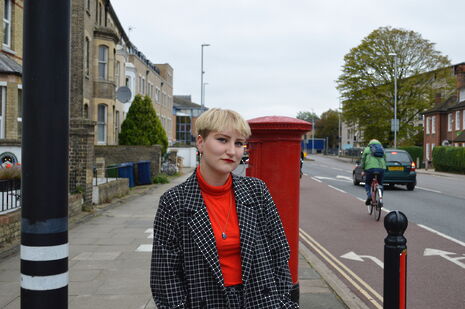Finding film in Cambridge: A beginners guide
As she enters her third year, Bea Goddard reflects on her experience as a filmmaker in Cambridge and shares her tips on how to start out.
In my first term Cambridge, I knew I wanted to make films, but I had no idea how. I didn’t see the Cambridge Film Association (CFA) stand at the Freshers Fair and I didn’t know anyone who had made any films in Cambridge. Since then, I’ve worked on four films (three documentaries and one short fiction) and am currently working on my fifth film.

Almost exactly two years ago, I felt extremely disempowered about environmental breakdown and decided I wanted to make a documentary about how Cambridge was (or wasn’t) tackling it. This became ‘The Cambridge Climate.’ I had the idea, but I didn’t have the resources to make it happen. I had no equipment or experience aside from some really awful (I mean awful) short fiction films I’d made with my friends in sixth form.
After some googling, I found CFA and spammed their Facebook inbox with all my questions. They told me to join the Cambridge Film Facebook group to do a call out for crew. I borrowed kit from CFA and learnt from my team members and the people we interviewed about how to actually make the film.
Looking back, my first film is one of my proudest achievements. It may not be the highest quality film I’ve made, but what I learnt from it were undeniably useful in making my next three documentaries; ‘Their Story’ (a documentary about rough sleepers and vulnerably housed individuals, to be released online on Saturday 30th November at 5pm on www.facebook.com/theirstorycambridge), ‘It Takes Art’ (exploring different art forms in discussing feminism, co-directed with Lina Fradin) and my current project ‘Hit Like A Girl’ (following the women’s team of the Cambridge University Amateur Boxing Club, exploring sexism in sport as well as the struggles and joys of training for an intense sport while studying).
I think there is no better way to learn about filmmaking than learning on the job, but here’s some of the things I’ve learnt in the last two years.
- Ask questions to anyone who does anything vaguely film related, if they don’t know the answer, they can put you in touch with someone who will. CFA exist to facilitate filmmaking and are very willing to answer your questions and put call outs to their emails. Find them on Facebook.(https://www.facebook.com/CambridgeFilmAssociation)
- Equally, ask people to watch your films after you’ve made them – this could be friends, family, on social media, or even filmmakers you admire (it’s worth at least emailing them).
- You don’t need your own kit, you can borrow the CFA kit by messaging that year’s kit officer.
- Watch as many other films as you can. I’ve started a notebook of all the documentaries I watch so I can refer to what I thought about how certain films were shot or structured.
- You don’t have to go in and direct a film straight away. You can do a call out with an idea you’ve had, or produce/direct/write/shoot/edit the whole thing if you want, but it’s worth applying to projects people post on the Cambridge Film or Cambridge Filmmakers (https://www.facebook.com/groups/cambridgefilmmakers/) groups.
- If you want to lead a project, copy other people’s call-out posts if you’re not sure how to write them. Give a brief introduction to the film and provide some photographs as visual references so people get a sense of your vision.
- The more people you have on your team, the more people you can delegate too (you really don’t have to do everything yourself).
- When filming interviews, use two cameras as this makes cuts smoother in the edit (but make sure they are both shooting in the same format) and frame shots so that people fill most of the screen.
- Be reasonable on how big a project you have the capacity for. Also note, most film festivals consider short films below 20 minutes, and most film schools and talent managers usually won’t watch anything longer than that, so keep this in mind if you want to use it for these.
- There are loads of funding sources in Cambridge willing to fund short films, the CFA have a full list but check out Trinity Filmmaking Society and available college funds. I’ve raised over £500 from a college music and drama fund so it is very worth applying to ones that aren’t film specific.
- It doesn’t matter if your film isn’t what you expected or wanted it to be, you’ve made something and that’s an achievement in itself. You will have definitely learnt a lot in the process.
- Try making different types of films. I tried out producing a short fiction piece last year and just didn’t get as excited about it as I do about documentaries. Now I know that I definitely prefer documentaries - that’s fine.
Overall though, go make some movies; no experience is required.
Bea Goddard’s latest film is out on 30th November: www.facebook.com/theirstorycambridge)
 News / Students form new left-wing society in criticism of CULC3 September 2025
News / Students form new left-wing society in criticism of CULC3 September 2025 News / Tompkins Table 2025: Trinity widens gap on Christ’s19 August 2025
News / Tompkins Table 2025: Trinity widens gap on Christ’s19 August 2025 News / Cambridge’s tallest building restored to former glory1 September 2025
News / Cambridge’s tallest building restored to former glory1 September 2025 News / Council rejects Wolfson’s planned expansion28 August 2025
News / Council rejects Wolfson’s planned expansion28 August 2025 Interviews / GK Barry’s journey from Revs to Reality TV31 August 2025
Interviews / GK Barry’s journey from Revs to Reality TV31 August 2025








